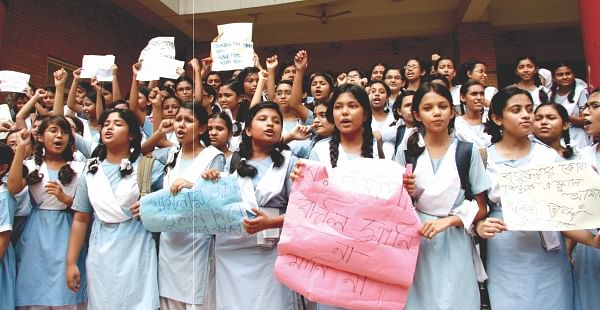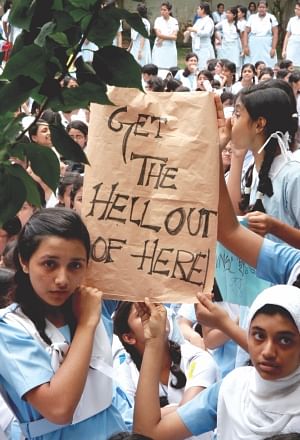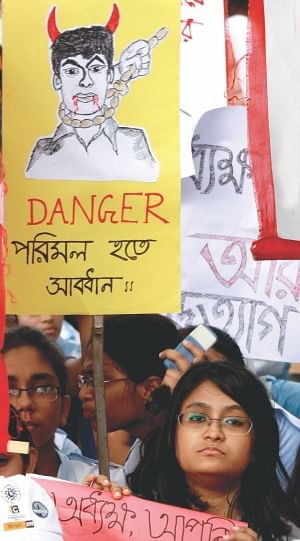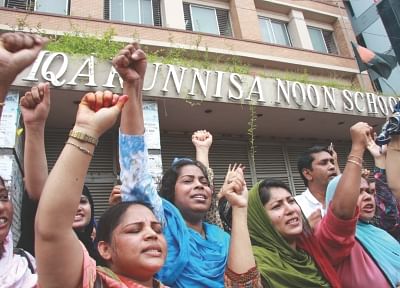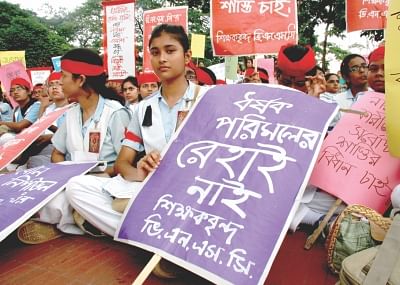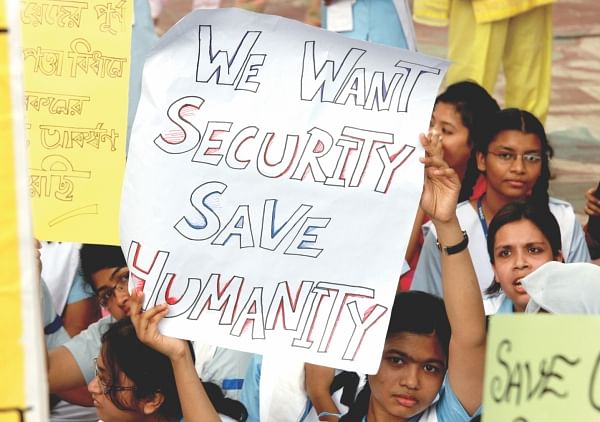| Home - Back Issues - The Team - Contact Us |
 |
| Volume 10 |Issue 29 | July 29, 2011 | |
|
|
Cover Story Unmasking The Predator Most parents, especially those who stay at home will agree that the most peaceful, relaxing time of day for them is when their children are at school. Why? Because during those few hours of the day, they can be worry free about their little ones. They know their children are in safe, trustworthy hands and will be well taken care of by their teachers and the school authorities. The parents of a certain sixteen-year-old girl were probably thinking along the same lines, when their daughter went after school to her teacher, Porimol Joydhor for extra help with her Bangla lessons. They trusted this man because he had been appointed to teach at Viqarunnisa Noon School, one of the most reputed schools in Dhaka, which their daughter attended, where everyone knew him and everyone spoke well of him. They never imagined in their wildest dreams, that this man would one-day rape their precious child, blackmail her, terrorise her and rape her again, leaving her broken and devastated and possibly scarred for life.
ANIKA HOSSAIN Crimes committed against children, no matter how regularly they appear in the news, never fail to shock the senses. The students of Viqarunnisa and their parents, along with several women's/human rights organisations held demonstrations demanding justice for the victim, and exemplary punishment for her rapist. They demanded accountability from the school authorities. While this outrage is completely justified, and those involved in this atrocious crime must be brought to justice as quickly as possible, we must ask ourselves some very important questions–how did it come to this? How do the likes of Porimol Joydhor, get access to, and opportunity to attack children in the first place? Most importantly, is he the only one to blame for what happened to this child?
A student of Viqarunnisa Noon School (VNS), pleading anonymity claims there was more than one person involved in this crime, "There were two other teachers helping Porimol Joydhor. I don't know the details, but I heard from the victim's close friends that they were standing guard at the door, I know for sure that Borun sir was one of them. She didn't tell anyone what happened at first, because she was scared that he would release pictures of her, which he took during the rape, on the Internet." Another student of Viqarunnisa College, also pleading anonymity says, "Her parents are in poor health and she did not want to upset them. When she told her friends what happened after the second time he raped her, they went directly to Lutfur Rahman, the branch-in-charge of the Bashundhara campus and he ignored their pleas for help. Husne Ara Begum, our principal also tried to cover up the entire matter. In my opinion, they are all responsible." Principal Husne Ara Begum on the other hand, denies all allegations made against her. "I am not responsible for what happened to this girl," she states. "This incident did not even happen in school. It happened at a private coaching center and I have no control over what people do outside this school." Husne Ara Begum claims that she herself plays no role in recruiting teachers and that the board alone is responsible for hiring Porimol Joydhor. "All I know is that he was good at teaching his subject and that is why students went to his coaching classes. I have never received any complaints about him until now." The principal claims she took immediate action after she had discovered that this incident had taken place. "The first attack took place on May 28 and the second on June 17, but I was first made aware of it on June 28, through a petition submitted to me signed by 46 students of the school. This petition protests Porimol Joydhar's inappropriate behaviour towards students in general, but there is no mention of any particular incident or student in this letter."
The letter submitted by protesting students dated June 28, addressed to the principal, states, "The behaviour displayed by our Bangla teacher Porimol Joydhor is becoming more and more grossly inappropriate, reprehensible, and of a sexual nature every day. He has begun to cross all limits and his behaviour has affected and continues to affect many students in a negative way. Students are now concerned about their safety around this man. Furthermore, his behaviour towards other teachers is also becoming increasingly offensive. We consider this outrageous and refuse to accept this man as our teacher any longer. We demand that you remove him from his post and punish him for his actions immediately." According to Husne Ara Begum, she dismissed Joydhor immediately after she received this letter of complaint from students and teachers, the news of which was published on July 1 in many newspapers. "I wasted no time in taking immediate action. I fired the man, but I only heard about the rape from other students. No written complaint was submitted to me." Upon hearing the news, the principal claims that she contacted the parents and family members of the victim several times and requested them to submit a written complaint to the school. "This would enable me to file a case against Joydhor with the police. I approached them several times, but they refused to do so. I finally received a written complaint from the victim on July 4 and immediately made a police complaint. Joydhor was arrested on July 6." The principal claims that she acted promptly and appropriately, "I did my best and I do not know why I am being charged with aiding and abetting a rape, I have all the documents to prove it" she says. "What we should be wondering about, is why this girl went back to Joydhor's coaching class after he raped her the first time. Doesn't matter if she was being blackmailed. She shouldn't have gone back." As the friends, family, teachers and the school authorities of the victim continue their blame game, one begins to wonder who is truly responsible for this tragic incident. The truth is, whether knowingly or unknowingly, everyone had a role to play. Incidents like these, although occurring with increasing frequency lately, do not happen everyday. But that does not mean that this cannot happen to anyone, at any time, in any place and to believe that one is far removed from the risk of this happening, is foolish. The key to protect children from these crimes is to be vigilant. It never hurts to take precautions. Lets begin with schools, which exist not only to provide education, but also to ensure safety and awareness of their students. When appointing staff members, whether they are teachers, assistants, administrative personnel or security guards, the school board should do a thorough background check. In a country like Bangladesh, it is close to impossible to check if someone has a criminal record, but references should be mandatory and they should be verified thoroughly before any staff member is hired.
The school authority's job is not over after they have recruited their staff. They must observe them carefully and ensure that they are behaving in an appropriate manner toward the students. Dr Harold Bijoy Rodrigues, principal of St. Joseph Higher Secondary School says, "Since the issue of eve-teasing and harassment of girls, especially in educational institutions, have been coming up over and over again in various media coverage for the past several months, the Viqarunnisa School authorities should have taken the matter more seriously by advocating measures that safeguard its students from becoming victims of such malice." At St Josephs, extra precautions are taken to ensure every child's safety. "Teachers at St. Joseph Higher Secondary School are hired predominantly on the basis of educational qualifications," says Rodrigues, "Then of course, other aspects such as teaching ability, knowledge of subject matter, personal demeanor, etc. are also considered seriously. In the case of teachers who come from other schools, their backgrounds are checked thoroughly and references are solicited as needed. After having hired a teacher, his/her behaviour is strongly monitored through personal periodical interventions of the principal, weekly teachers' meetings, counseling sessions, and parent-teacher programs." It is important to know that people who commit sex crimes against children (pedophiles and ephebophiles) are not easily recognisable, even by experienced psychologists. Porimol Joydhor came to Viqarunnisa with a glowing reference from his previous employers at the Uttara High School and College, which stated that "He is of good character and we hope he has a bright future ahead of him." Most often, these offenders are friendly and popular and easily likeable. They do however, have some common traits that stand out. They are usually male adults who appear on the surface to be extremely hard working as well as family oriented. They usually tend to be better educated (in case of teachers), talented, and more religious than the average person. They usually target children who are quiet, reserved and have family problems and they tend to shower attention and praise on children they do not abuse, which is a way they avoid suspicion and gain the trust of other students and parents. These teachers always find reasons to be alone with their victims, whether it is to give them extra help with their school work or coach them for a sport. They prefer to do this in a secure place with closed doors.
Child molestation is an addiction and behaviour and not just a single disorder. It is a process during which the molester targets his victims and works his way slowly to get close to them before they attack. Usually, the predator will not seek sexual satisfaction, the act of molestation itself is painful and humiliating for them, but they enjoy the thrill and the risk involved in committing this act. The offenders are likely to relate more to children than adults in many situations and consider themselves peers/ friends rather than guardians and mentors. They usually do not have friends their own age and prefer to spend long hours working, especially with children, which gives them a sense of self worth and accomplishment. That being said, it is up to the school authorities to find ways to monitor their employees and be on guard. "We do a thorough family background and reference check before we hire any teachers," says Shabnam Ahmed, the coordinator of the senior section of Dhanmondi Tutorial. "We also have a floor in charge for each floor in our building who makes rounds daily, during classes and observes the rapport between teachers and their students. Doors are never allowed to be closed and we also have a strict policy against corporal punishment. Furthermore, we have a student counselor available who welcomes any questions, concerns or complaints students and their parents may have regarding schoolwork, teachers etc." Students at St Joseph's also receive similar services from the school. "In the school, we have two professional counselors for students' counseling and a team of prefects for maintaining discipline," says Principal Rodrigues. "Students are encouraged and often referred to any one of these persons for necessary help and guidance. Parents are always welcome to express their concerns about their children in regards to relationships with their teachers. Usually, concerns are expressed to the counselors or persons responsible for discipline, who in turn bring the matter to the principal for necessary action," he explains.
Sunnydale School, a well-reputed institution in Dhaka also provides counseling services through their school psychologists to all students, at hours, which allow these visits to be kept confidential. This service allows students to speak to a responsible third party about their experience with their teachers and other adults in school or outside of it, openly, without the fear of getting into trouble. Shabnam Hossain, a teacher of Sunnydale says, "As an educator, I believe that children need academic as well as social education. While teachers have a tremendous responsibility to protect the children placed in their care, they are not solely responsible for these children. I believe that parents have to play a vital role in a child's social awareness and education." According to Hossain, people nowadays are getting married later in life and having fewer children. They tend to pamper these children more and allow them more freedom than they themselves had while growing up. "But parents must remember that children do not understand what is best for them. They may look and act mature at times but they are still children. For example, parents should have a say in the way their teenage daughters dress and the way they interact with others. A child may not be aware of what is appropriate at all times. I really do believe that parents should make their children aware of the dangers around them from a very young age. We teachers should do the same along with providing academic education." There are certain kinds of education that only parents can provide. Parents instill values and morals in their children during their growing stages to make them wholesome, good people. Along with this education, it is also important for parents nowadays to inform their children of the dangers around them. They don't have to scare their children with horror stories about rape and murder. No, that is not necessary and only serves to traumatise the child. What they can do is provide certain guidelines for the child to follow. For example, the child can be told about what parts of his/her body is off limits for anyone to touch. They can be instructed never to be alone with an adult, even if it is a teacher without a third person present. Parents can talk to their children everyday just to know who they interact with and the level and nature of this interaction. They can remind their children that adults can be caregivers and mentors but not peers. Parents must also make it a point to know where their children are, whom they are with and what they are doing as much as possible. If parents show an active interest in the child's activities both academic and otherwise, it helps keep predators at bay. When selecting schools for their children, it is very important for parents to do a thorough research on the school's history and standard of conduct and education before enrolling their child. "I looked for a school close to my home, which had a proper school building and wasn't just an apartment complex converted into a school," says Mushtari Kabir, the mother of a 13-year-old boy, attending Kid's Tutorial. "It had to have fields, open spaces with no private nooks and crannies. I also checked the standard of education, the O'Levels results of the students and what kind of families they came from. It is also important for me to send my child to a place where attendance, timing and monitoring the children's activities take priority." Kabir talks to her child regularly about his activities in school and so far she has learned that corporal punishment is used in this institution. "My son tells me that teachers often hit students and then threaten them not to tell their parents. They also regularly encourage students to attend private coaching classes in their homes and sometimes refuse to explain the course work in class to force students to attend coaching centres. If girls complain about their male classmates harassing them, they are often dismissed and disregarded." There are certain warning signals parents can watch out for to determine whether their child is either being physically or sexually abused. For example, if the child suddenly refuses to go to school, the child's grades fall inexplicably, the child has abrupt mood changes or is suddenly more aggressive than usual. The child may also withdraw from his/her family or friends, exhibit age-inappropriate sexual language or behaviour, have scars on their bodies, possess new toys, extra money or other goodies which their parents have not given them. The child may also suddenly suffer from loss of appetite and have nightmares or trouble falling asleep. If one or more of these symptoms start showing, there is a high probability that the child is being abused in some way. "We always try our best but how can we prevent these incidents from happening?" asks Salma Alam, whose teenage daughter attends Sunbeams School. "My husband and I raised our children with alot of care and protection. We have always picked them up and dropped them off at schools and coaching centers and friends' houses." Alam has done a thorough reference check on every teacher her daughter goes to. She and her husband sit at the dining table each night and talk about their children's' day with them so they know what is going on in their lives. "My children always confide in me. I always know where they are and whom they are with. Of course school authorities and teachers are responsible for our children but at the end of the day no one cares more about them than their parents. The biggest responsibility lies with us to shield them from the Porimol Joydhors of the world. I try to give my kids the best possible advice and I don't judge them. I find that to be very effective when we communicate. It is the best we can do." Child abuse can take different shapes and forms. Whether it is in the form of a Director Administration of a school attacking a student with a ruler till she is black and blue with bruises, or 41 children losing their lives in a road accident due to irresponsible driving, or little girls being raped by the school security guards and their trusted teachers–it is all around us. If we turn a blind eye, we are partaking in them and are equally responsible for these crimes. Principal Husne Ara Begum of The VNS asked why Joydhor's victim returned to his class after being raped. The answer is, because this child lost faith in the ability of the society to protect her. So much so that she went back to relive her worst nightmare. We shouldn't be questioning her conduct. We, as a society should be horrified by what she was driven to do simply because of our neglect. Awareness is a must
In our country where human rights are violated in various ways, stalking and sexual harassment of women, perhaps, are the most frequently occurring violation of rights. Insensitive attitude towards women has increased to such an extent that a girl may experience molestation even at her school. The recent incident of sexual harassment of a girl in one of Dhaka's reputed schools makes us question the responsibility of an educational institution in bringing up the next generation. Education Minister Nurul Islam Nahid talks about the initiatives that his ministry has taken to stop such occurrences and make educational institutions safer for the students. Farhana Urmee What steps has your ministry taken to combat the incidents of sexual harassment in educational institutions? It has been two years that we are taking strong steps to curb the problem of sexual harassment of women. There are laws to punish the criminals. Again, through mobile court we have started the trial of such crimes without any delay. Above all we have waged a social movement and awareness campaign. We have conducted massive campaigns against stalking, involving students, teachers, guardians and leaders of different localities. The campaign emphasised the necessity of protecting our girls. The convention also stressed the necessity to mobilise our boys who remain at the reprehensible end of the offence of sexual harassment. We wanted to identify the reasons for which the crime is taking place. They (the boys) should not be ignored on the issue of why they are moving towards the practice of thinking woman as vulnerable and as an object of stalking. Unemployment and lack of cultural involvement among boys make them lose progressive thoughts. Hence, they tend to get involved in such offence. These matters should also be taken under consideration. The aim of the campaign is to protect the girls as well as motive the boys so that they do not conduct such heinous crime. Does the recent incident of molestation of a student in one of the reputed schools in the capital demand any immediate action? Of course, the perpetrator must be tried and given punishment for what he has done. Porimol, the accused in this particular case has already been taken into police custody. An exemplary punishment will discourage further occurrence of such crimes in future. Again, only trying the perpetrator is not enough, we have to make people aware of such social crimes, as awareness is the only thing that can make the society break the curse of stalking. But molestation by the teacher is utterly unfortunate and disgraceful.
How does one solve this problem? The first and foremost thing is to change the attitude of the boys towards girls. We are launching a massive campaign on the issue. Secondly, I would like to urge the heads of the educational institutions to be more careful while recruiting teachers. Verify their (job applicants') academic records along with other background information. But it is not enough to assume that a teacher with a good record will never be of any threat to the students. Therefore, we are going to introduce a guidance manual for the teachers during their training. The manual will help them understand their obligation and their DOs and DONTs as a teacher. We are also providing guidance on the behaviour and attitude of the teacher in and outside the classroom. The value, lifestyle and thoughts of a teacher put a direct impact on the new generation, thus their being ideal indeed is truly important. There is no doubt that if such crimes take place, the perpetrator will be punished. Porimol Joydhar is already in detention. But that will not be the end of the story. We need to bring a change in our society; we have to make sure that this kind of incident never takes place again. In this particular case, it is natural that the students will get aggravated and protest. But while changing the authority of the school, any kind of partisan attitude is not expected. Do you think the ratio of the number of school inspectors and schools is fair enough to conduct proper school inspection on a regular basis? Yes, I agree the whole system of inspection and assessing schools is somewhat weak. The number of the inspectors is not enough to conduct regular inspection in different schools across the country. We lack required staffs in this sector; besides we need more budgets and planning if we want to increase the number. Meanwhile, we are coordinating among different departments and taking help from the administration. For schools in remote areas where no inspector is assigned, we ask the local administrative officer to go on a sudden visit to different schools. We have committees for education at upazila levels, which provide us the assessment reports on schools. Above all, the reach of media expands to the remotest areas of the country, which is another plus point for us, so that if any misconduct occurs at any school, people including ourselves get to know about it immediately and thus can take a stern action. We are monitoring schools using different mechanisms. Some educational institutions having no governing body often tend to suppress such crimes occurring there; again, other sorts of harassment like bullying or rebuking school children, torturing them physically or psychologically may remain in the dark, what will be your stand to combat these offences? Well, first of all, the institutions must come up with complaints. They will be the source of information and only then we can intervene. No school can run without our approval and no school can remain beyond our law and policy. But if such practices prevail that schools are likely to suppress the matter when the rights of students are violated or they are humiliated or tortured, it will not be tolerated. We have already banned corporal punishment at schools along with any sort of psychological pressure on students. Another thing is very important — to stop the practice of tuitions and coaching. The business interest between students and teachers must be limited. Right after the incident at Viqarunnisa Noon School we called a meeting with the headmasters and teachers of different schools where the issue of coaching and tuitions was also raised. For that we have to take initiatives to ensure quality classroom lessons and make the whole learning process effective. The ministry has already started working on this agenda.
Copyright
(R) thedailystar.net 2011 |
||||||||||||
